Monsignor Joseph Granato Italian Culture Award Acknowledges Frank’s Lifelong Support and Contributions to His Alma Mater
(Pictured above: Seton Hall University dignitaries presented Frank Cannata with the Monsignor Joseph Granato Italian Culture Award including (from left to right) Prof. William Connell, La Motta Chair; Dr. Karen Boroff, Interim Provost; and Dr. Mary Meehan, Interim President.)
Frank G. Cannata, CEO and president of The Cannata Report, was honored by his alma mater with the Monsignor Joseph Granato Italian Culture Award bestowed by The Charles and Joan Alberto Italian Studies Institute of Seton Hall University during a ceremony at the university’s Bethany Hall on Tuesday evening.
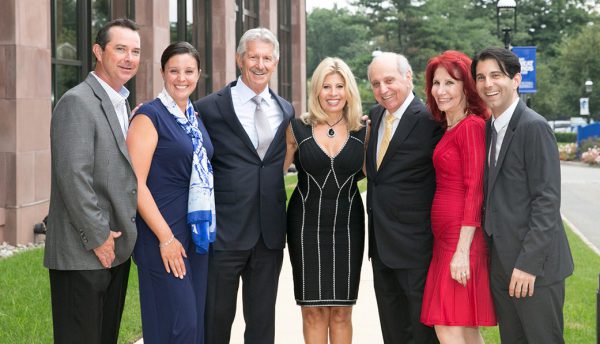 Above: Industry notables in attendance to celebrate Frank Cannata’s honor from Seton Hall University include Danielle Wolowitz of Kyocera (second from left) and her husband Chris Wolowitz (far left), and Larry Weiss of Atlantic Tomorrow’s Office (third from left) and his wife Linda Weiss (center) photographed on the Seton Hall campus with Frank, Carol and CJ Cannata.
Above: Industry notables in attendance to celebrate Frank Cannata’s honor from Seton Hall University include Danielle Wolowitz of Kyocera (second from left) and her husband Chris Wolowitz (far left), and Larry Weiss of Atlantic Tomorrow’s Office (third from left) and his wife Linda Weiss (center) photographed on the Seton Hall campus with Frank, Carol and CJ Cannata.
Cannata, previously honored with the university’s Humanitarian of the Year Award, was recognized for his lifelong support of his alma mater and his instrumental contributions in the creation of a world-class Italian Studies program at Seton Hall. Dr. Mary Meehan, interim President, and Dr. Karen Boroff, interim Provost, presented Cannata with his award at the ceremony attended by university dignitaries, faculty and staff. Also in attendance were Cannata’s associates from UNICO National, an Italian-American service organization, as well as industry colleagues, friends, and family.
In their remarks, Dr. Meehan and Dr. Boroff both cited Cannata’s devotion to the university, his commitment to community service and fundraising for various charitable organizations, his role as enthusiastic advocate and staunch supporter of the Italian Studies program at Seton Hall as well the establishment of endowed memorial scholarships. Said Dr. Boroff, “I cannot think of anyone who embodies the traits of “˜servant-leader’ more than Frank Cannata.”
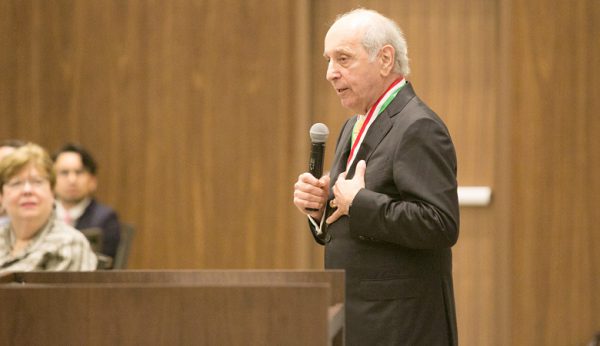 Above: Frank Cannata delivers “A Message of Hope,” his keynote presentation at Seton Hall University’s Italian Studies Awards Ceremony.
Above: Frank Cannata delivers “A Message of Hope,” his keynote presentation at Seton Hall University’s Italian Studies Awards Ceremony.
Said Cannata, a graduate of Seton Hall “˜55, “It is with deep gratitude that I accept the Monsignor Joseph Granato Italian Culture Medal. It is a tremendous milestone for both my family and me and I am overwhelmed to be singled out for this honor. I am always mindful of the fact nobody does anything worthwhile alone so I must acknowledge my many associates of UNICO National and the faculty and leadership of Seton Hall University who share with me a lifetime commitment to preserve and promote Italian language, history, and culture. What makes this honor even more significant is that my desire to serve my community was fostered at Seton Hall University and for that, I am eternally grateful.”
Cannata provided the evening’s keynote address titled “A Message of Hope” and spoke of his love for the university that shaped him and gave him a clear understanding of his purpose in life. In his signature self-effacing manner, Cannata opened his remarks by saying he was getting a lot of praise for things that a lot of people have been involved in and accomplished together. He shared there were many significant benefactors, alumni, and friends of Seton Hall with whom he shares the credit for making this all possible, especially fellow Seton Hall alumni Joseph La Motta ’54 and Charles Alberto ’55, and friend Salvatore Valente.
Cannata’s remarks focused on the many people in his life that have inspired him by their drive to achieve success and their steadfast determination to never give up. Cannata peppered his address with stories and anecdotes from throughout his life, including his university days, his time serving in the Marine Corps, and his career working in what started as the copy machine industry that today embodies the office technology industry.
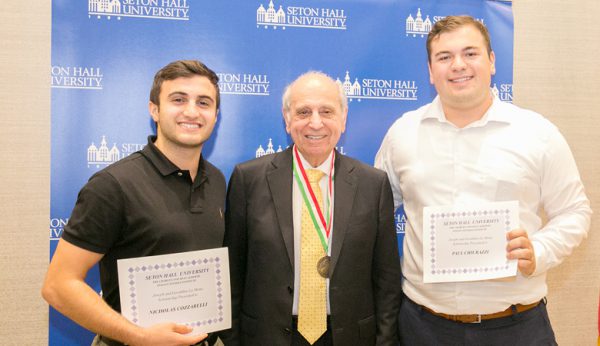 Above: Frank is pictured with student scholars Nicholas Cozzarelli (left) and Paul Chiurazzi, both awarded Joseph and Geraldine La Motta Endowed Scholarships.
Above: Frank is pictured with student scholars Nicholas Cozzarelli (left) and Paul Chiurazzi, both awarded Joseph and Geraldine La Motta Endowed Scholarships.
The common thread of each story highlighted an individual’s “never quit” attitude, such as the many copier dealers who embodied true entrepreneurial spirit by launching their businesses in their basements, garages, and cars and then growing them into thriving enterprises. Or those who have weathered economic downturns and the changing technology landscape by embracing change and adapting new business models.
Cannata shared his love of history, calling himself a “serious amateur historian” and quoted remarks by Winston Churchill as words to live by: “Success is not final, failure is not fatal: it is the courage to continue that counts.”
Cannata closed his keynote by speaking directly to the student scholars in attendance who were honored during the evening. He began by apologizing to them for the failings of his generation to not provide affordable college tuition and closed by telling them that a wide worldview offered opportunities and perspective that was invaluable, both personally and professionally. He advised them to think globally, learn a foreign language and above all, foster a personal desire to achieve while always remembering to give back. Following his inspirational address, many of the student scholars gathered at the podium to meet Cannata and have their photographs taken with him.
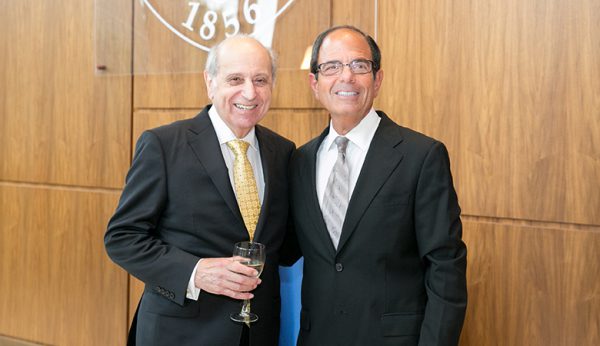 Above: Frank’s long-time industry friend and colleague BTA General Counsel Bob Goldberg took time to attend the event and show his support.
Above: Frank’s long-time industry friend and colleague BTA General Counsel Bob Goldberg took time to attend the event and show his support.
The Monsignor Joseph Granato Italian Culture Medal was established in 1999 by the Joseph M. and Geraldine C. La Motta Chair in Italian Studies as a way for Seton Hall University to honor individuals who have distinguished themselves in the preservation and promotion of Italian culture. The first recipient, after whom this medal is named, was Monsignor Joseph Granato ’51, a Seton Hall alumnus, for his untiring work over more than 50 years at St. Lucy’s Roman Catholic Church in Newark. St. Lucy’s is a parish that was established by Italian immigrants at the end of the nineteenth century. Thanks largely to Monsignor Granato’s efforts the church has been able to preserve its vibrant character through more than half a century of dramatic change and renewal.
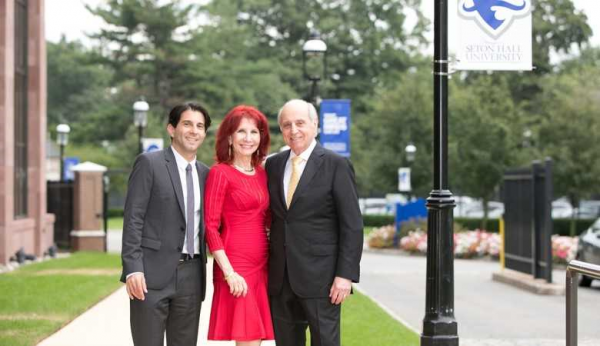 CJ, Carol, and Frank Cannata photographed on the campus of Seton Hall University.
CJ, Carol, and Frank Cannata photographed on the campus of Seton Hall University.
In addition to Monsignor Granato, previous recipients include Sebastian de Grazia, Ph.D., Sr. Margherita Marchione, Ph.D., Nazario Paragano Sr., Frank Farinella ’49, Hon. Paolo Toschi, Howard McGinn, Ph.D., Hon. Andrea Barbaria, William Connell, Ph.D., and Salvatore Valente.
Said Professor William Connell, Joseph M. and Geraldine C. La Motta Chair of Italian Studies, who also spoke at the ceremony. “Frank has been one of Seton Hall’s most faithful alumni over more than five decades. He has a great eye for talent, and he is always on the lookout for ways to help his alma mater. He has been a terrific fundraiser, generating support from multiple sources for both Italian Studies and the Stillman School of Business.”
“Frank was the one who brought the idea of an endowed Italian Studies Chair to the University and made that campaign’s first donation,” said Connell. “The Chair, now called the La Motta Chair in Italian Studies, has been in full operation since 1998, during which time the Italian Studies endowment has quintupled and achieved spectacular international recognition. Twenty years later it is now time to celebrate the alumnus who put it all in motion.”
Access Related Content
Visit the www.thecannatareport.com. To become a subscriber, visit www.thecannatareport.com/register or contact cjcannata@cannatareport.com directly. Bulk subscription rates are also available.

